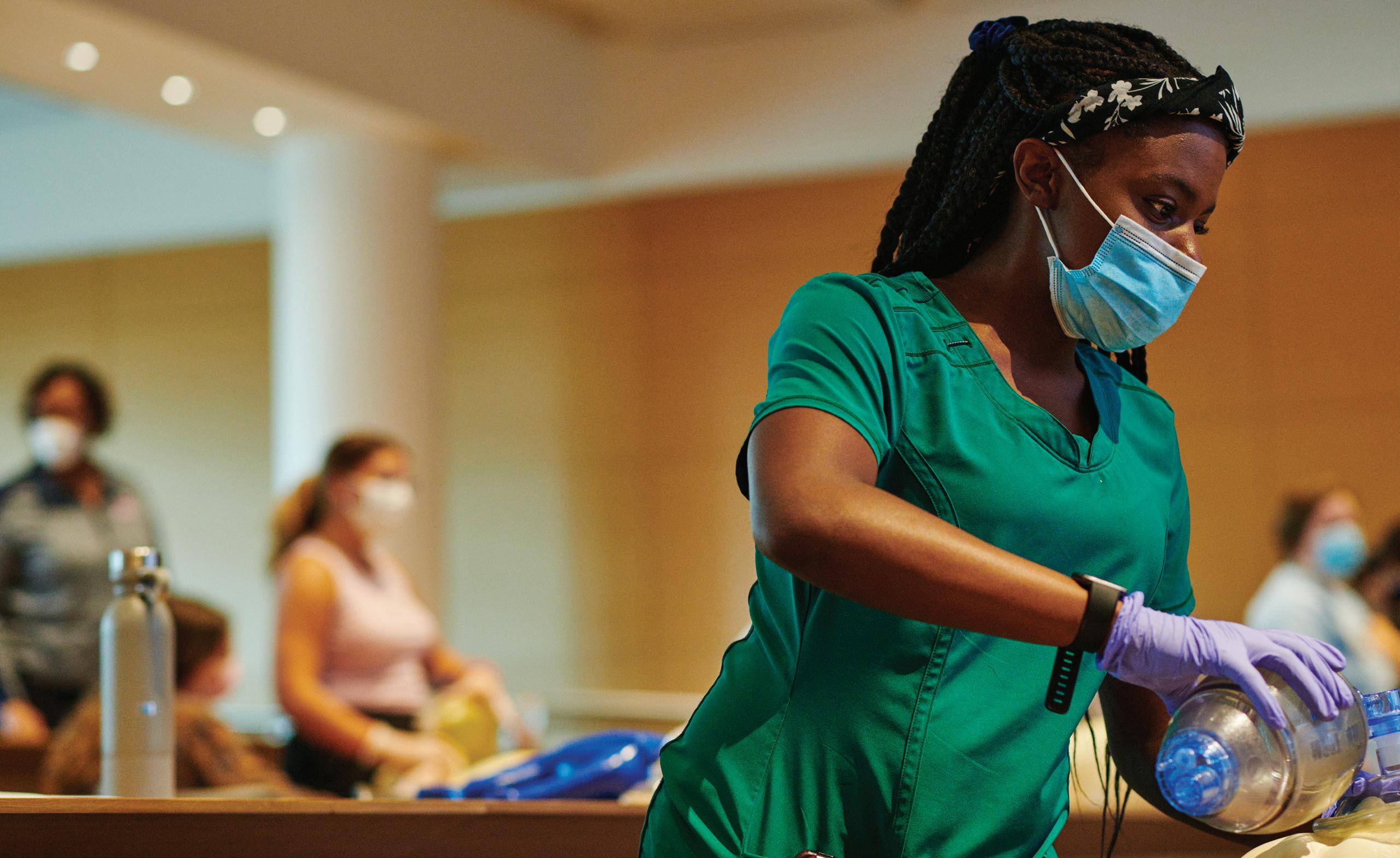
9 minute read
You May Just Be Right – You Could Do Better! Reflections on Nurse Leadership
By ANGELA BARRON McBRIDE, Ph.D., RN, FAAN
In the second edition of her Growth and Development of Nurse Leaders, Angela Barron McBride, Ph.D., RN, FAAN interrogates her own and others’ conceptions of the “stuff” that comprises an effective leader. Below is an excerpt from the first chapter, “The Right Stuff:”
I didn’t set out to be a leader, but I also began to see over time that I had some abilities in that direction. The first time you think “Even I could do better than that,” you mean that more as an insult to the person you’re criticizing than you mean it as a compliment to your own abilities.
However, if you find yourself regularly thinking some version of “I could do better than what is now in place,” then you should, in my opinion, redirect your energies away from the disapproving part of that stance and seriously contemplate your leadership potential. You may just be right—you could do better! Said or implied often enough, “Even I could do better” is likely to get you invited to assume more leadership and refusing to accept this challenge will look more unseemly over time. You (and others) reach a point of “put up or shut up.” “I wanted to be a good nurse, but back then I didn’t see nurses as leaders who could inspire movements or headlines.”
I was once asked in an interview, “When did you first know that you were a leader?” The interviewer wanted to find out whether I had been a leader in my early years, but I found that question difficult to answer, as it seemed improper for me to admit that I grew up thinking of myself as in any way exceptional. My view of leadership, even at the time of that interview, was still shaped by some residual notion of a leader as “the great one,” because while I was growing up I had been encouraged to read the lives of statesmen, scientists, and saints for inspiration (all noticeably lacking in female role models). Since I didn’t see myself becoming president of the country, destined for a Nobel Prize, or ready for martyrdom, I didn’t see myself as prime leader material. I wanted to be a good nurse, but back then I didn’t see nurses as leaders who could inspire movements or headlines.
What Is The “Right Stuff?”
Historically, leaders have been described in heroic terms. Read the literature on the characteristics shared by leaders, and you might conclude that they are some combination of the following traits: intelligent, responsible, persistent, perceptive, self-confident, sociable, articulate, dominant, determined, cooperative, trustworthy, dependable, friendly, tolerant, influential, motivated, outgoing, upright, tall, and masculine. Although some of these traits seem to apply equally to women—being responsible, trustworthy, and friendly—others clearly do not. Men are typically regarded as agents of change—assertive, dominant, authoritative, competent—whereas women are viewed as more communal—warm, sympathetic, kind, helpful.
You can imagine women being perceptive more than dominant, and this difference gives women leaders a documented advantage in settings or positions that place a premium on collaboration and a disadvantage in those that value toughness. But on the whole, leader stereotypes remain predominantly masculine, which induces a kind of schizophrenic thinking if you are a female nurse: You’ve absorbed all the descriptions of leadership and nursing and may feel fundamentally split between wanting to be a trailblazer and a nurturer, with the two seemingly irreconcilable though they are not in reality. Men in nursing have a problem, too, because even when they are expected to lead, they may feel that they still aren’t permitted to do so in nursing because they’re not seen as sympathetic enough.
In more recent times, the leadership literature has seriously questioned the longstanding exclusive emphasis on whether the person in charge has the right stuff on the grounds that leaders are substantially influenced by the situations they Angela Barron McBride, Ph.D., RN, FAAN

encounter, including their ability to harness their followers. In this view, a person might be an effective leader in one situation but not in another one. Tagliareni and Brewington (2018) prefer the notion of “roving” leadership whereby everyone is expected to be a leader depending on challenges and circumstances.
However, even those who think that a cataloging of attributes isn’t enough to explain leadership tend to put forward their own lists of desired traits. And those lists can be off-putting because they usually include more positive attributes than most ordinary people see themselves as either possessing or acquiring in a lifetime devoted to selfimprovement. Admitting that
you are a leader takes considerable self-assurance but owning up to having leader-like virtues may be even more difficult, particularly if you have been raised to be modest and selfeffacing, as many women have. In recent years, I heard a Latina physician who was a semi-finalist for a prestigious grant answer the question “We are going to have a hard time selecting next year’s awardees from this talented pool, so tell us what makes you special?” with “Oh, the pool is talented and I don’t think I’m any more special than anyone else.” Needless to say, the final decision didn’t go in her favor, because she was judged to lack the pluck required to put herself forward in this competitive situation. But it isn’t just women who may have a tendency to be unassuming. A man who comes from a culture that emphasizes collectivism (e.g., Native Americans, Asians) is more likely to have been schooled to act deferentially than someone taught to think more individualistically.
When You Are Expected To Be The Best—But Simultaneously Also Expected Not To Be Self-Important…
Nursing has not been untouched by the fascination to break leadership down into certain attributes of personality and character. Like other fields, our profession has studied acknowledged leaders to try to figure out what the accomplished have in common. Intrigued by the subject as a result of their experience in the Robert Wood Johnson Foundation’s Executive Nurse Fellows Program, Houser and Player interviewed 12 nurse leaders who were widely recognized for their achievements and concluded that each was visionary, scholarly, resilient, committed, courageous, responsive, creative, innovative, thoughtful, and humble.
Although their positive regard for humility runs counter to the preferential weight usually given in the leadership literature to dominance, their selection of that trait does demonstrate a dilemma for many nurse (and female) leaders: They are expected to be the best but simultaneously also expected not to be self-important. You see some of the same competing forces in a recent study of personal attributes expected of nursing deans. They are expected to have vision, courage, and passion, and simultaneously be facilitating, sharing, and supportive.
I find it useful not to think of leaders as destined to succeed, because thinking of them as born that way keeps them beyond reach. The more that leaders are defined as innately special, the more we can excuse ourselves if we’re not like them and rationalize our passive behavior by saying, “I’m not cut out to be a leader.” If we think we can grow the dispositions and skills they have over time, then the focus is on what we’re going to do to move in that direction and moving forward occupies our attention. This produces better momentum.
For An Effective Nurse Leader, Practical Intelligence Is More Valuable Than A High IQ
The reality is that nurses as a group have in large measure what leaders are supposed to possess. First and foremost, we are taught to value problemsolving (i.e., the nursing process), systems thinking, and the common good. Even if some of us aren’t extroverts, we are all socialized to develop empathy, value interpersonal relationships, and respect cultural differences, all of which are central to emotional and social intelligence. Integrity is a core leadership trait, and Americans have given nurses the highest marks when asked to rate the honesty and ethical standards of various professions for nearly two decades.
Given the competitive nature of admissions to nursing schools, today’s nurses do not lack academic intelligence, but their test scores may be less critical to their leadership potential than their strong practical intelligence. Practical intelligence, which has been described in military structures as applying knowledge gained from experience to the solution of everyday predicaments, could be a definition of nursing. Effective problem-solving is what is needed for a changing world with complex social problems and that competency is at the heart of our practice profession. It is important to remember that practical thinking is as important, if not more important than IQ, when it comes to ensuring a productive future for society because real wisdom is the use of one’s abilities for the common good, but to do that you first have to take yourself seriously so you can be taken seriously by others.
Angela Barron McBride is a Distinguished Professor and University Dean Emerita at Indiana University School of Nursing, was designated a Living Legend by the American Academy of Nursing and has received honors and awards throughout her career. Her study of ways in which nurses can exert leadership in medicine-dominated and male-dominated settings led to her award-winning book The Growth and Development of Nurse Leaders (now in its second edition).
EXPAND Your Career Opportunities
On average, nurse practitioners in Ohio earn 50% more than registered nurses.* Take your career and your earning opportunities to the next level with a graduate degree from Frances Payne Bolton School of Nursing. #11 Master of Science in Nursing** #15 Doctor of Nursing Practice** #28 for National Institutes of Health-funded research
Our highly ranked programs will give you the education and network you need to improve patient care, develop your management skills and become a leader in your field. Part-time and distance friendly options available.





